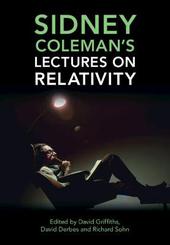
|
Sidney Coleman's Lectures on Relativity
Hardback
Main Details
| Title |
Sidney Coleman's Lectures on Relativity
|
| Authors and Contributors |
Edited by David J. Griffiths
|
|
Edited by David Derbes
|
|
Edited by Richard B. Sohn
|
| Physical Properties |
| Format:Hardback | | Pages:223 | | Dimensions(mm): Height 256,Width 175 |
|
| Category/Genre | Physics
Relativity physics |
|---|
| ISBN/Barcode |
9781316511725
|
| Classifications | Dewey:530.11 |
|---|
| Audience | | Tertiary Education (US: College) | |
|---|
| Illustrations |
Worked examples or Exercises
|
|
Publishing Details |
| Publisher |
Cambridge University Press
|
| Imprint |
Cambridge University Press
|
| Publication Date |
13 January 2022 |
| Publication Country |
United Kingdom
|
Description
Sidney Coleman (1937-2007) earned his doctorate at Caltech under Murray Gell-Mann. Before completing his thesis, he was hired by Harvard and remained there his entire career. A celebrated particle theorist, he is perhaps best known for his brilliant lectures, given at Harvard and in a series of summer school courses at Erice, Sicily. Three times in the 1960s he taught a graduate course on Special and General Relativity; this book is based on lecture notes taken by three of his students and compiled by the Editors.
Author Biography
David J. Griffiths received his BA (1964) and PhD (1970) from Harvard University, and was Professor of Physics at Reed College from 1978 until 2009. He is author of Introduction to Electrodynamics (4th ed. Cambridge University Press, 2017), Introduction to Quantum Mechanics (3rd ed. with Darrell Schroeter, Cambridge University Press, 2018), Introduction to Elementary Particles (2nd ed. Wiley, 2008), and Revolutions in Twentieth-Century Physics (Cambridge, 2013). He is also co-editor of Quantum Field Theory Lectures of Sidney Coleman (World Scientific, 2018). He was a PhD student of Sidney Coleman, and this book is based in part on his lecture notes from Coleman's course on Relativity. David Derbes received his BA (1974) from Princeton University, Part III of the Mathematical Tripos at the University of Cambridge (1975), and his PhD (1979) from the University of Edinburgh. He was a high school teacher for forty years, winning a Golden Apple in 2007. He has edited Freeman Dyson's Advanced Quantum Mechanics (World Scientific, 2007, 2011), and is co-editor of Lillian Lieber's The Einstein Theory of Relativity (Paul Dry Books, Philadelphia, 2008) and Quantum Field Theory Lectures of Sidney Coleman (World Scientific, 2018). Richard B. Sohn received his BA (1969) and PhD (1976) in Physics from the University of Connecticut, and a Master's in Physics (1971) from the University of Maryland. He has held roles as a professor in physics, a research scientist, and a software engineer. He is co-editor of Quantum Field Theory Lectures of Sidney Coleman, (World Scientific, 2018).
Reviews'Sidney Coleman was one of the deepest thinkers and clearest teachers of modern physics. His Lectures on Relativity are a delight: brimming with insights, they invite us to survey Einstein's greatest scientific legacy with a modern theorist's toolkit.' David Kaiser, Professor of Physics and the History of Science, Massachusetts Institute of Technology 'One important lesson my esteemed mentor, Sidney Coleman, imparted to me was that if one were to claim that one understood something, one should mean it. Coleman is the undisputed master of clear understanding. Apparently, many theoretical physicists never got the memo. I hope that the reader of this, and other, Coleman books will eventually get the message by osmosis.' A. Zee, Theoretical Physicist at University of California, Santa Barbara and the author of several books on physics, including Einstein Gravity in a Nutshell 'It is a pleasure to read Sidney Coleman's Lectures on Relativity, characterized as one would expect by exceptional clarity and insight. They are surprisingly modern, to boot, including discussions of black holes and cosmology. Any fan of relativity would benefit from reading them.' Sean M. Carroll, California Institute of Technology 'In Sidney Coleman's Lectures on Relativity, we get the benefit of Sidney's questions. There are hundreds of question marks here, some leading the reader to the next topic and some highlighting confusing subtleties. It is not the Socratic method exactly because most of the questions are addressed to the smartest person in the room - Sidney himself. But his supremely logical answers lead the reader through this important subject.' Howard Georgi, Mallinckrodt Professor of Physics, Harvard University
|